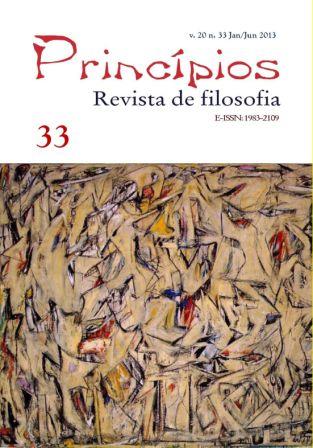SOBRE ÉTICA E RELIGIÃO EM KANT
Keywords:
Religião, Mal radical, Estado, Conflito das faculdadesAbstract
Esse artigo explora algumas relações na filosofia prática
kantiana entre ética e religião. Defendem-se aqui duas teses.
Primeira, que sobre a temática da superação do mal radical, a
filosofia kantiana não estabelece a necessidade de se fazer uma
escolha entre reforma ou revolução, pois ambas se referem a
perspectivas distintas sobre a consideração da ação moral. Ligado a
isso, a segunda tese é a de que as religiões históricas e a Teologia
podem ter um papel positivo no esclarecimento moral, desde que
elas entrem em um conflito legal com a faculdade da Filosofia.
Downloads
References
FORSCHNER, Maximilian. Über die verschiedenen Bedeutungen des „Hangs zum Bösen“. In: HÖFFE, Otfried (Hrsg.). Immanuel Kant: Die Religion innerhalbt der Grenzen der blossen Vernunft. Berlin: Akademie Verlag, 2011, 71-90.
GEISMANN, Georg. Kant und kein Ende. Studien zur Moral-, Religions- und Geschichtsphilosophie. Würzburg: Königshausen & Neumann, 2009.
HENRICH, Dieter. Zu Kants Begriff der Philosophie. In: KAULBACH, Friedrich; RITTER, Joachim (Hrgs.). Kritik und Metaphysik (Festschrift für Heinz Heimsoeth), Berlin: de Gruyter, 1966, 40-59.
HÖFFE, Otfried. „Königliche Völker“: zu Kants kosmopolitischer Rechts- und Friedenstheorie. Frankfurt am Main: Suhrkamp, 2001.
KANT, I. Gesammelte Schriften. Hrsg.: Bd. 1-22 Preussische Akademie der Wissenschaften. Berlin 1900ff.
_____. Beantwortung der Frage: Was ist Aufklärung? Trad. Artur Morão. In: A paz perpétua e outros opúsculos. Lisboa: Edições 70, 2004.
_____. Das Ende aller Dinge. Trad. Artur Morão. In: A paz perpétua e outros opúsculos. Lisboa: Edições 70, 2004.
_____. Der Streit der Fakultäten. Trad. Artur Morão. Lisboa: Edições 70, 1993.
_____. Die Metaphysik der Sitten. Trad. José Lamego. Lisboa: Calouste Gulbenkian, 2005.
_____. Die Religion innerhalb der Grenzen der blo?en Vernunft. Trad. Artur Morão. Lisboa: Edições 70, 1992.
_____. Kritik der praktischen Vernunft. Trad. Valerio Rohden. São Paulo: Martins Fontes, 2002.
_____. Kritik der reinen Vernunft. Trad. da edição B de Valerio Rohden e Udo Baldur Moosburger. São Paulo: Abril Cultural, 1980.
_____. Was hei?t: Sich im Denken Orientiren? Trad. Artur Morão. In: A paz perpétua e outros opúsculos. Lisboa: Edições 70, 2004.
SCHNEEWIND, Jerome B. Good out of evil: Kant and the idea of unsocial sociability. In: RORTY, Amélie O., SCHMIDT, James (Eds.). Kant’s Idea for a Universal History with a Cosmopolitan Aim. Cambridge: Cambridge University Press, 2009, 94-111.
STERN, Paul. The problem of history and temporality in kantian ethics. In: Review of Metaphysics, n.39, 505-545, 1986.
WOOD, Allen W. Kant's fourth proposition: the unsociable sociability of human nature. In: RORTY, Amélie O., SCHMIDT, James (Eds.). Kant’s Idea for a Universal History with a Cosmopolitan Aim. Cambridge: University Press, 2009, 112-128.
Downloads
Published
How to Cite
Issue
Section
License
Authors retain copyright and grant the journal right of first publication with the work simultaneously licensed under a Creative Commons Attribution License that allows others to share the work with an acknowledgement of the work's authorship and initial publication in this journal.


 Português (Brasil)
Português (Brasil) English
English Español (España)
Español (España) Français (Canada)
Français (Canada)


